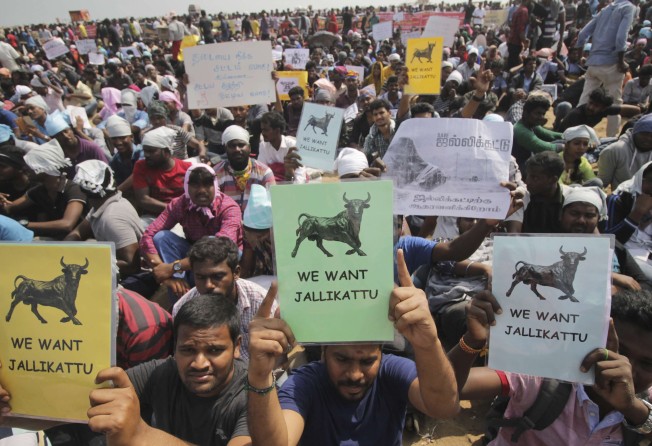
Violence in India as anger over bull-fighting ban spreads to Singapore
Tens of thousands of protestors rally against a court ruling to stop ‘jallikattu’, but some observers say the issue is a rallying cry for deeper resentments

Widespread demonstrations in the Indian state of Tamil Nadu demanding the resumption of a banned bull-taming sport are a flash point for much deeper anti-establishment resentments, some observers said Monday, as violence broke out for the first time since protests began last week.
The state government on Monday moved to quell the tens of thousands protesting by enacting legislation to circumvent a 2014 ban on the seasonal sport of “jallikattu” by India’s top court. But that did not appease protesters, who torched a police station and pelted officers with rocks after being forcibly removed from a beach in the state capital of Chennai where they had been camped since early last week.

The protests have also resonated with segments of the Tamil diaspora scattered around the world. In Singapore, where foreigners are not allowed to stage public protests, a weekend event organised in support of events in Tamil Nadu triggered a sharp reaction from the police.
Jallikattu is a sport that involves adult males subduing angry bulls by grabbing or riding them. The event is said to be thousands of years old and usually takes place in villages in conjunction with the Pongal harvest festival.
India’s Supreme Court first banned the sport in 2014. But in January 2016, Prime Minister Narendra Modi’s government made amendments to the legislation allowing the practise. In July, the court heard a petition against the change that was brought on by the country’s Animal Welfare Board, and upheld its original ban.
Tamil Nadu-based observers said the protests have become a lightning rod for wider discontent among the state’s youth amid anxiety about its political stability and long-term economic prospects.
“The jallikattu protest is a manifestation of Tamil angst against the establishment over a number of longstanding issues,” said Sathiya Moorthy, a Chennai-based researcher with the Observer Research Foundation think tank.

Young people in the state – one of the wealthiest and most literate in India – are aggrieved about perceived government inactions over river water and dam disputes with the neighbouring Karnataka and Kerala states, Moorthy said.
“Some of the farmer-related issues have found expression among the younger generation,” he said.
However, the protests, which last week caused a shutdown of schools, factories and retail outlets, are not supported by everyone in the state. Some local celebrities who voiced support for animal rights groups faced a torrent of criticism online.
The People for the Ethical Treatment of Animals (PETA) rights group in India has characterised jallikattu as cruel because in some cases bulls are made ready for the sport by torture, including the rubbing of chili powder on their genitals and being fed liquor. Proponents of the sport say these practises are isolated, and instead point out that the practise of bull taming – and consequent bull-rearing – ensures that there is a healthy male-to-female ratio of cattle.

Poorva Joshipura, the chief executive of PETA India, said the sport is outright cruelty to animals.
“PETA India’s position is that cruelty to animals, children, the elderly and others is morally repugnant,” she told the South China Morning Post.
“Images of men pouncing on a frightened bull and bulls – sometimes liquored up, their tails deliberately broken and their eyes full of chili peppers” were antithetical to the non-violence preached by India’s founder Mahatma Gandhi, she said. According to her group, the sport has also led to 43 deaths and more than 5,000 injuries between 2008 and 2014.
On Sunday, after the government’s executive order lifting the ban, a bull tamer and a spectator were gored to death, with 129 others injured at an event in a rural village.

Deepu Sebastian Edmond, a journalist with The Hindu newspaper who was on the ground covering the protests, said events remained fluid as the authorities struggled to contain intensifying violence.
Protesters were refusing to leave the Marina Beach in Chennai late Monday as the state assembly convened a special sitting to enact the law needed to permanently bypass the 2014 Supreme Court ruling.
Urban protesters were mobilised to various demonstration sites by social media, but the movement remains largely leaderless.
“Some protesters have left silently. Some have stayed put. At this point nobody knows [what is going to happen]. There hasn’t been any time for a calm discussion,” Edmond said.
Singaporean national Vishal Vijay, who was in Chennai for business-related meetings, said “the city has come to a standstill with business shut and traffic clogged up, the effects of which don’t really benefit anyone”.

“There is a sense that the local government is still in transition [after the death of former chief minister J. Jayalalithaa] and didn’t take a strong enough stance against the protests and violence,” he said.
In Singapore, where there are tens of thousands of migrant labourers from Tamil Nadu, police said they are investigating 30 people for “suspected involvement in a public assembly without a permit” at a neighbourhood park on Saturday.
“Preliminary investigation revealed that the subjects were there to show their support for Jallikattu and the ongoing protest in India against its ban,” the police said in a statement.
It had issued an earlier warning urging foreigners not to import their domestic politics into the city state. Public protests are strictly restricted in Singapore.